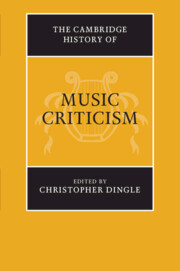Book contents
- The Cambridge History of Music Criticism
- The Cambridge History of Music
- The Cambridge History of Music Criticism
- Copyright page
- Contents
- Music Examples, Figures and Tables
- Notes on Contributors
- Acknowledgements
- Introduction
- Part I The Early History of Music Criticism
- Part II The Rise of the Press
- Part III Critical Influence and Influences
- Part IV Entering the Twentieth Century
- Part V New Areas
- 24 Jazz Criticism in America
- 25 Catalysing Latin American Identities: Alejo Carpentier’s Music Criticism as a Cuban Case Study
- 26 Writing about Popular Music
- 27 Working in the Cool Capitalism Complex: The Role of Critics in the World Music Field
- 28 Cultural Anxieties, Aspirational Cosmopolitanism and Capacity Building: Music Criticism in Singapore
- Part VI Developments since the Second World War
- Postlude
- Bibliography
- Index
24 - Jazz Criticism in America
from Part V - New Areas
Published online by Cambridge University Press: 21 August 2019
- The Cambridge History of Music Criticism
- The Cambridge History of Music
- The Cambridge History of Music Criticism
- Copyright page
- Contents
- Music Examples, Figures and Tables
- Notes on Contributors
- Acknowledgements
- Introduction
- Part I The Early History of Music Criticism
- Part II The Rise of the Press
- Part III Critical Influence and Influences
- Part IV Entering the Twentieth Century
- Part V New Areas
- 24 Jazz Criticism in America
- 25 Catalysing Latin American Identities: Alejo Carpentier’s Music Criticism as a Cuban Case Study
- 26 Writing about Popular Music
- 27 Working in the Cool Capitalism Complex: The Role of Critics in the World Music Field
- 28 Cultural Anxieties, Aspirational Cosmopolitanism and Capacity Building: Music Criticism in Singapore
- Part VI Developments since the Second World War
- Postlude
- Bibliography
- Index
Summary
Since the formal academic study of jazz (historical, musicological, analytical or cultural) developed only very late in the twentieth century, critics have inevitably played a crucial role in developing discourses about the music. This has been a great strength as well as an occasional weakness, but it has given criticism a centrality in the literature of jazz that is noteworthy, particularly in comparison with the role of criticism in Western European art music in the same period.
In this chapter, I have restricted my coverage of the subject in several key respects. In the first place, there is very little consideration of pre-1930 criticism, a large and fascinating body of writing, but which with relatively few exceptions has more historical and cultural than musical significance.
- Type
- Chapter
- Information
- The Cambridge History of Music Criticism , pp. 459 - 483Publisher: Cambridge University PressPrint publication year: 2019

